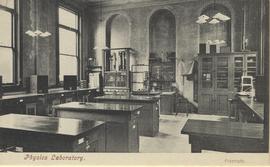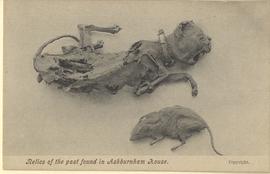His prep school, Feltham Fleet, was much stricter than Westminster. Late for the Westminster entrance exam because his father’s car broke down. [3:10] A sherry party for the parents of new boys at Busby’s. [3:36] The characters of different houses. Busby’s was a good balance of liberality and discipline. [6:30] Theo Zinn, a Classics teacher, was a family friend and the reason Gysin came to Westminster. His teaching style complemented Denis Moylan’s. [8:03] A description of various contemporaries. [10:13] His involvement in the Busby play. [11:21] How his time at Westminster has helped him. A lack of exaggerated respect for status and hierarchies. [12:45] The Oxbridge exams. Interviews were less important then. [14:02] The College Street Clarion. Its sporadic appearance. [14:55] The Busby house ledgers. [16:43] The change in the tone of the school when Dr Rae took over in 1970. The school became more involved in wider society. [18:47] The food. Dull but edible. He was the house champion jelly-eater. [20:53] The benefits of the weekly boarding system. [21:42] His involvement in the Busby Society, for former Busbites, and its annual dinner.
One copy annotated on reverse by R.S. Chalk, as follows:
'Soon after his arrival as H.M., Costley White decreed that all Under School Forms on the Classical Side should do a modicum of Science (Physics). Tho’ accorded a somewhat mixed reception, this was a wise measure.
I am thankful for the elements of Physics (Archimedes’ Principle etc) that I learnt while in CVI under the gentle and precise F.O.M. Earp (whom we classicists liked well).
Those first two periods of elementary Science on Wednesday mornings were a welcome relief to the hard grind in Classics under the relentless E.L. Fox.
The chief impression of Science was how easy it all was by comparison! Lectures were taken quite light-heartedly, and when experiments were being conducted, F.O.M.E. could naturally not devote attention to more than two boys at a time. Consequently my partner (Dennis Binyon) and myself had many a mild lark between his visits to our pitch!
It was noticeable also during Prep how little work scientists had to do compared with classics!'
One copy annotated on reverse by R.S. Chalk, as follows:
'My recollections of the macabre ‘relics’ (gathered, I think, from Pereira, a fellow KS who had originally been up Ashburnham) are as follows:-
During repairs to Ashburnham House, some years before our time, there were discovered the mummified corpses of a CAT and (its prospective victim) a RAT. How they had met their simultaneous fate none could day. (Were they ‘gassed’ during the Great Fire of Ashburnham in 1731?)
This I remember being told: ‘The Cat was wearing a silver collar.’ (In the photo this appear to be a silver plate on a leather collar. Had anyone thought of it, the hall-mark on this would have given an approximate date.)
About 1923-4 I remember reading (perhaps in ‘House Notes’ in the ‘Eliza’) that “the Cat and Rat had been duly returned to Ashburnham Upper’, amid some mock ceremony. I cannot imagine these ‘relics’ were treasured there for long.'
Arrived at Westminster from a prep school on a farm in Sussex where there were only 60 pupils. The Westminster Masters’ gowns and mortar boards. The Westminster pupils’ uniform was complicated and varied according to whether it was a saint’s day or in season or out of season. [3.54] Arrival at Westminster and learning Westminster slang. [5.54] They put on plays all the time in different languages. [6.43] Busby’s. [7.18] The Latin Play, which was in the summer then. [9.49] The timetable. There were very few day boys then. There were only three in Busby’s. [12.33] Spartan living conditions. No heating. Meals. They would draw lots not to sit next to the House Master’s wife. [15.25] Fagging. [17.02] The role of the House Tutors. [18.42] Lunches in Busby’s. The popularity of the House Matron. Personality of the House Master. [23.10] Busby’s a relatively liberal house. [23.50] Music his favourite subject. A German Master, Sanger, who played Mozart and Haydn symphonies through lessons. The French Teach, Hugo Garden, was a world expert on Mahler. Both were refugees. [27.19] Charles Keeley. His teaching style. [28.52] Class sizes. [30.00] Musical facilities and the Director of Music, Arnold Foster, who was Vaughan Williams’ musical secretary. Conditions for music teaching. [35.03] Viola lessons from Beryl Ireland in the Master of the Scholars’ drawing room. The school organist. [37.45] David Burke, the first full-time music teacher. [39.49] He sometimes covered for Burke when he had left the school. [40.36] Exams. [41.56] Reaction to his decision to go to a conservatoire. [44.57] Learning the organ with the Abbey organist. [48.03] The school Abbey choir. Changing standards in church music. [49.44] School and house concerts. Difficulties of re-starting the musical tradition in the school. [56.52] The choir. [59.18] The orchestra’s repertoire. [59.58] House concerts. [1.05.44] Busby house prayers. Ramona, the house maid, paid to sabotage house prayers. [1.09.43] Masters who stand out. [1.14.43] The importance of the Common Room. [1.16.03] Boys’ family backgrounds at the time. Career prospects. [1.27.57] Competition between House Masters to have the most attractive maids. Boys’ appreciation. Throwing oranges at the monks in the monastery opposite.

